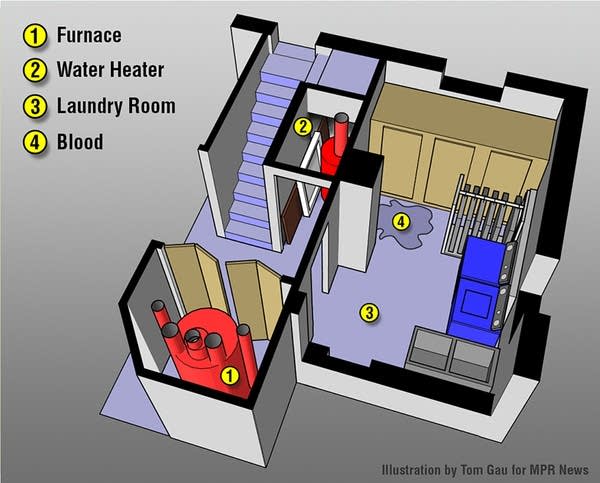Grand jury testimony today in Terrance Franklin's death
Go Deeper.
Create an account or log in to save stories.
Like this?
Thanks for liking this story! We have added it to a list of your favorite stories.

A Hennepin County Grand Jury will hear testimony today in the police officer-involved shooting death of 22-year-old Terrance Franklin.
Franklin died in May from multiple gunshot wounds after scuffling with police officers in the basement of a Minneapolis home. Two officers were also wounded during the confrontation.
Police say Franklin was a burglary suspect fleeing officers when he broke into a home in the Uptown area.
• Diagram: The basement where Franklin died
Turn Up Your Support
MPR News helps you turn down the noise and build shared understanding. Turn up your support for this public resource and keep trusted journalism accessible to all.
While fighting with Sgt. Andy Stender, his dog and other officers in the basement, Franklin tried to get control of an officer's firearm, police said. The shots that were fired that day killed Franklin and wounded officers Michael Meath and Ricardo Muro.
FAMILY UNCONVINCED
The Police Department's explanation of what happened in the Minneapolis basement didn't convince Franklin's family. Walter Franklin would later say that his son was shot in the back of the head.

"Any reasonable person hearing that scenario who has any kind of knowledge of law enforcement techniques and tactics just isn't buying it," Mike Padden, an attorney who represents Franklin's family, said of the department's version of events.
Padden said he thinks police are trying to cover their tracks over a badly botched confrontation. He said independent experts Franklin's parents have hired to determined what happened to their son have uncovered details which will prove that. But he wouldn't disclose them.
"We believe we have a good case," Padden said. "We believe the evidence, when all the evidence is on the table, is going to show this young man was wrongfully killed. Frankly, I think once the public sees this additional evidence, I think it's going to be rather disturbing to people."
Padden said given the county's track record, he does not expect the grand jury to indict any of the officers. He said Hennepin County Attorney Mike Freeman has a pro-police bias which has led him to exonerate officers.

Freeman, who has said he won't comment on the grand jury process has called that criticism is "ludicrous." Data from the Hennepin County Attorney's Office show since 2000, no grand jury has indicted a Minneapolis police officer involved in the death of a civilian.
That track record contradicts the usual outcome of grand jury investigations. Derik Fettig, a former assistant United States Attorney in Los Angeles, said some indictments are too easy to obtain from grand juries.
"There's that old expression that a prosecutor could indict a ham sandwich if he wanted to," said Fettig, a teaching fellow at Hamline University Law School. "That may go too far, but certainly, more often than not, grand jurors do return indictments than they would reject them."
Fettig doesn't have a theory as to why officer-involved investigations, at least in Hennepin County, buck the trend. He said in Minnesota, grand juries are required to review cases in which prosecutors seek the strictest penalty possible -- life in prison without chance of release.
Freeman has said the county makes it a practice to have grand juries investigate all police officer-related deaths.
GRAND JURY HEARING CLOSED TO PUBLIC
Like other grand jury investigations, the Franklin case hearing will be shrouded in secrecy. No judge or members of the public will be present. No lawyers representing the officers or the Franklin family will be there either.
Fettig said a court reporter will record the proceedings and the only lawyer present will be from the Hennepin County Attorney's office.
"In fact, the prosecutor acts as the legal advisor to the grand jurors," he said. "So if they have a legal question, the prosecutor would answer that. Now, a prosecutor can't advocate or argue for an indictment. And the prosecutor is not present during the vote."
Fettig said after the grand jurors have heard all the testimony, they will decide if there is enough evidence to bring charges against any of the officers. Grand jurors often reach their decisions in a few minutes -- not days or weeks the way trial jurors often do, he said.
If the testimony isn't done by the end of the day, the grand jury will reconvene next Thursday.
If no criminal charges are filed, Padden, the Franklin family's attorney, said he may request a federal investigation of the shooting, and file a civil wrongful death suit against the officers and the city of Minneapolis.
• Illustration: The Minneapolis basement where Terrance Franklin died
Dear reader,
Political debates with family or friends can get heated. But what if there was a way to handle them better?
You can learn how to have civil political conversations with our new e-book!
Download our free e-book, Talking Sense: Have Hard Political Conversations, Better, and learn how to talk without the tension.




